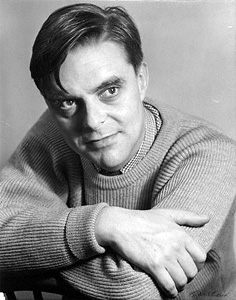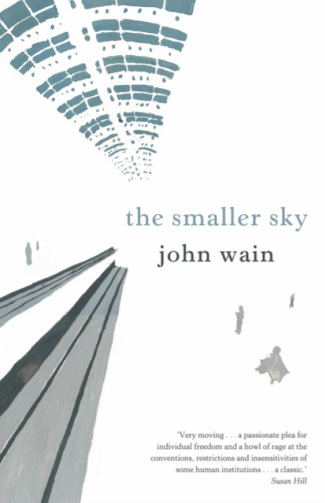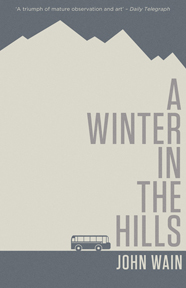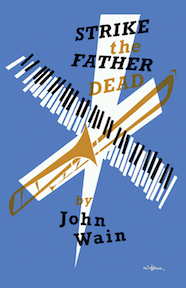|
BOOK DETAILS
Trade paper ISBN-13: 978-1939140340 List Price: $15.99 U.S. Pages: 144 Published: 2013 |
The Smaller Sky (1967)
John Wain With a new introduction by Alice Ferrebe Book Description
Arthur Geary, a 45-year-old research scientist, quits his job and leaves his wife and children, taking up residence in a hotel near Paddington Station, where he passes all his time sitting on the platforms, watching the people and trains come and go. Overwhelmed by the stresses of modern life, including his difficult job and failing marriage, Geary finds the limitless sky of London unbearable and seeks refuge beneath the ‘smaller sky’ of the glass-roofed station. But when friends and family become concerned with his unusual behaviour, and he begins to be hounded by psychiatrists and television reporters, Geary’s search for peace and freedom becomes increasingly desperate . . . One of the great English men of letters of the 20th century, John Wain (1925-1994) won almost every major British literary award during a career that spanned five decades, and his works are now being rediscovered. The Smaller Sky (1967), a classic novel of alienation and despair, is one of Wain’s most enduring achievements and returns to print for the first time in more than 35 years. This edition includes a new introduction by Alice Ferrebe. |
reviews
‘A classic.’ - Susan Hill, author of The Woman in Black and I'm King of the Castle
‘John Wain’s best novel in a long time . . . an interesting story . . . stunning.’ - The Observer
‘John Wain’s contribution to the gathering army of lone, upset figures is a notable one.’ - William Trevor, Books and Bookmen
‘Harrowing but deeply compassionate . . . marks a new and impressive development in Mr. Wain’s writing.’ British Book News
‘This searching novel throws a critical spotlight on the life that the modern world compels us to lead.’ - Encounter
‘John Wain’s best novel in a long time . . . an interesting story . . . stunning.’ - The Observer
‘John Wain’s contribution to the gathering army of lone, upset figures is a notable one.’ - William Trevor, Books and Bookmen
‘Harrowing but deeply compassionate . . . marks a new and impressive development in Mr. Wain’s writing.’ British Book News
‘This searching novel throws a critical spotlight on the life that the modern world compels us to lead.’ - Encounter
ALSO AVAILABLE THROUGH ONLINE RETAILERS
MORE TITLES BY THIS AUTHOR
AUTHOR BIOGRAPHY

John Wain was born in 1925 in Stoke-on-Trent, Staffordshire. He attended St John’s College, Oxford, earning a BA in 1946 and an MA in 1950. A prolific author and man of letters, Wain wrote poetry, novels, criticism, and biographies during a writing career that spanned more than forty years.
He started out teaching at the University of Reading, but in 1953 left to pursue writing full-time. Wain’s first novel, Hurry on Down (1953; published in the United States as Born in Captivity) was a bestseller and launched Wain’s career as a novelist. The book ran into several hardcover printings and was often reprinted as a Penguin paperback; it is credited with paving the way for later British classics of the 1950s, including Kingsley Amis’s Lucky Jim (1954) and John Braine’s Room at the Top (1957). Wain followed his first novel with a number of other novels and short story collections, including Living in the Present (1955), The Contenders (1958), A Travelling Woman (1959), Strike the Father Dead (1962), The Young Visitors (1965), Nuncle, and Other Stories (1965), and Death of the Hind Legs and Other Stories (1966). A number of contemporary critics felt some of these works represented a falling-off from Wain’s successful debut novel, but his next novel, The Smaller Sky (1967), was well received, and is arguably Wain’s masterpiece. The Smaller Sky (forthcoming in a new edition from Valancourt Books) tells the story of a man overwhelmed by the stresses of his life, who seeks refuge beneath the ‘smaller sky’ of Paddington rail station. Among his later fiction, A Winter in the Hills (1970) and Young Shoulders (1982) were particularly well regarded; the latter novel won the Whitbread Award.
In 1973, Wain was appointed the first Professor of Poetry at Oxford University, and the following year his biography of Samuel Johnson won the James Tait Black Memorial Prize. His services to literature were recognized in 1984 when he was awarded a CBE. In the late 1980s, he began his ‘Oxford Trilogy’ with Where the Rivers Meet (1988), and the final volume, Hungry Generations, was published shortly after his death in 1994.
He started out teaching at the University of Reading, but in 1953 left to pursue writing full-time. Wain’s first novel, Hurry on Down (1953; published in the United States as Born in Captivity) was a bestseller and launched Wain’s career as a novelist. The book ran into several hardcover printings and was often reprinted as a Penguin paperback; it is credited with paving the way for later British classics of the 1950s, including Kingsley Amis’s Lucky Jim (1954) and John Braine’s Room at the Top (1957). Wain followed his first novel with a number of other novels and short story collections, including Living in the Present (1955), The Contenders (1958), A Travelling Woman (1959), Strike the Father Dead (1962), The Young Visitors (1965), Nuncle, and Other Stories (1965), and Death of the Hind Legs and Other Stories (1966). A number of contemporary critics felt some of these works represented a falling-off from Wain’s successful debut novel, but his next novel, The Smaller Sky (1967), was well received, and is arguably Wain’s masterpiece. The Smaller Sky (forthcoming in a new edition from Valancourt Books) tells the story of a man overwhelmed by the stresses of his life, who seeks refuge beneath the ‘smaller sky’ of Paddington rail station. Among his later fiction, A Winter in the Hills (1970) and Young Shoulders (1982) were particularly well regarded; the latter novel won the Whitbread Award.
In 1973, Wain was appointed the first Professor of Poetry at Oxford University, and the following year his biography of Samuel Johnson won the James Tait Black Memorial Prize. His services to literature were recognized in 1984 when he was awarded a CBE. In the late 1980s, he began his ‘Oxford Trilogy’ with Where the Rivers Meet (1988), and the final volume, Hungry Generations, was published shortly after his death in 1994.





